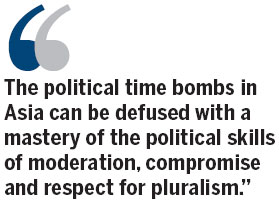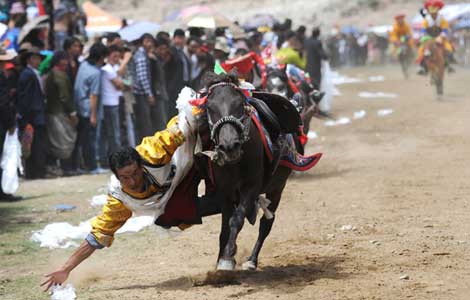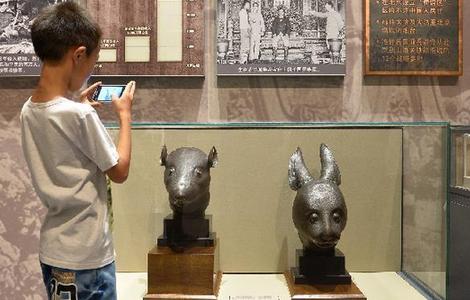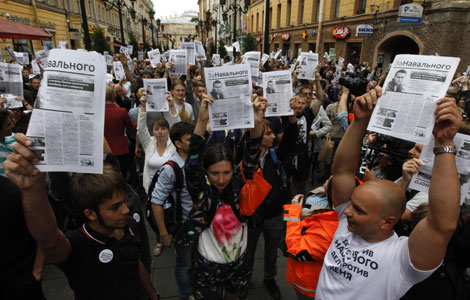Ethnic time bombs in Asia
Updated: 2013-07-20 07:11
By Fung Keung (HK Edition)
|
||||||||
Egypt's elected former president Mohammed Morsi was toppled by the military on July 3. The uprising against his rule, with 14 million people protesting on the streets at one point, is a reminder of the ticking political time bombs in Asia.
During his 12-month presidency, Morsi allegedly attempted to grab more power for his Muslim Brotherhood organization, ignored the interests of minorities and women, and made little effort to improve the grassroots' livelihood. At the brink of bloody clashes between Muslim Brotherhood members and Morsi's opponents, the military stepped in to restore order.
The clash of religions in Egypt resonates loud and clear in Asia. Countries facing similar volatile situations include Myanmar (Buddhist vs Muslim), the Philippines (Christian vs Muslim) and Indonesia (Muslim vs Christian). The clash of religions resoundingly underscores the centuries-old clash of civilizations.

Asian leaders must learn the lesson of Egypt's uprising to prevent bloody revolutions in their countries. Ruling parties, supported by secular or religious organizations notwithstanding, must study and possess the political finesse to have the minorities' interests at heart and share power with minority groups if feasible.
Egypt's authoritarian Morsi was accused of failing to deliver promises he made during the election a year ago. He had promised to improve the economy, boost employment and heed the needs of minorities and women. At present, Egypt's unemployment rate stands at 13 percent (and 40 percent among young people) and food and fuel prices are soaring.
Egypt's military, led by General Abdel Fattah al-Sisi, has appointed an economist, Hazem al-Beblawi, to be the prime minister, who, in turn, has named another liberal economist Ahmed Galal as finance minister. Galal has a doctoral degree from Boston University in the United States. It is obvious that Egypt's new leaders under the "temporary constitution" realize where the country's major problem lies - people's livelihood.
Al-Beblawi's transitional government must work with the Muslim Brotherhood in forming a coalition government when parliamentary elections are held in February 2014. The Muslim Brotherhood, which voted Morsi to power, is simply too big and powerful to be slighted.
Let us take a look at the political landscapes in Asia. The Philippine government has waged a war against fighters in the Muslim-held stronghold in Mindanao for many years. There doesn't seem to be light at the end of the political tunnel. The Muslims in Mindanao want an independent state. They have fought for independence since the Spanish occupation of the Philippines in the 1800s.
The conflict in Indonesia's Malacca state, where, in the past two years, 4,000 people have been killed in Christian-Muslim fighting, and 500,000 displaced, underlines the entrenched and bloody religious feud.

Today, the Karen and Shan minority groups in Myanmar fight against the government in the east of the country, while small armed groups of the Rohingya people are active in the western part of the country (the Rohingya use refugee camps in Bangladesh as bases). Sporadic conflicts also occur in other regions of Myanmar. Due to internal conflicts, around 160,000 Myanmese refugees have to live in Thailand.
This writer has little intention of haranguing the ruling parties in the Philippines, Indonesia and Myanmar and other Asian countries and telling them how to run their governments. The uprising in Egypt, however, should touch Asian leaders' nerves. Caring for the minorities' interests and sharing power with secular and minority groups are lessons Asian leaders can learn from the fall of the Morsi government in Egypt.
Egypt's transitional leaders must try their best to avoid a civil war between the Muslim Brotherhood and other secular and Christian groups. They should learn from the experience of Nigeria. In 1991, the Nigerian military didn't accept the election success of a Muslim-led party, which engendered a civil war that lasted for 10 years with thousands of people killed.
The political time bombs in Asia can be defused with a mastery of the political skills of moderation, compromise and respect for pluralism.
The author is coordinator of the B.S.Sc in financial journalism program at Hong Kong Baptist University.
(HK Edition 07/20/2013 page6)

 Giving take-out roast chicken a French twist
Giving take-out roast chicken a French twist
 Tibetan farmers enjoy Onkor festival
Tibetan farmers enjoy Onkor festival
 Girl mauled by mastiff needs $32,580 for surgery
Girl mauled by mastiff needs $32,580 for surgery
 Firefighters hold line against California wildfire
Firefighters hold line against California wildfire
 Rat, rabbit head sculptures on display
Rat, rabbit head sculptures on display
 Detroit files biggest ever US municipal bankruptcy
Detroit files biggest ever US municipal bankruptcy
 Russia jails opposition leader
Russia jails opposition leader
 Plane crash victims' parents seek answers
Plane crash victims' parents seek answers
Most Viewed
Editor's Picks

|

|

|

|

|

|
Today's Top News
'Trayvon Martin could have been me': Obama
Asiana legal fallout begins after deadly crash
Tokyo's 'big leap' aimed at China
Floor on lending rates axed by PBOC
Huawei backs UK security review
Blacklist on way for court defiance
Qinghai monks preaching the dangers of TB
Family of dead baby waits for autopsy
US Weekly

|

|






